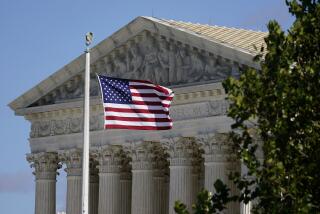Buffett Testifies in Trial Over Tax Deductions
- Share via
Billionaire investor Warren E. Buffett testified Monday in the trial of his investment firm’s two lawsuits, accusing the Internal Revenue Service of making it pay more than $23 million in taxes and interest by disallowing certain deductions.
The trial began in U.S. District Court in Lincoln, Neb., after some three years of legal wrangling between Berkshire Hathaway Inc. and the IRS.
The case stems from allegations that the IRS made an “erroneous, wrongful and illegal” interpretation of the U.S. Tax Code when it denied the deductions.
The original lawsuit, filed in 2002, said the IRS wrongly assessed more than $16 million in taxes and interest against Berkshire in 1989 and 1990. A second lawsuit said the IRS wrongly assessed the investment firm nearly $7 million in 1991.
The IRS disallowed the deductions after tracing $750 million in borrowed money that Berkshire allegedly used to purchase stocks in several companies, including Coca-Cola Co., Time-Warner Inc. and Wells Fargo & Co., according to court records. The agency based the denial on a change in the Tax Code that reduced deductions if borrowed money is directly attributable to an investment that pays a dividend.
Congress changed the code because of concern that some corporations were deliberately borrowing money for the purpose of buying dividend-paying stock, combining the dividends received and interest-on-indebtedness deductions, and converting pretax losses into after-tax gains.
Berkshire borrowed the money several times and put it into a principal bank account, according to court records.
But Berkshire said the money in that account came from several sources, was interchangeable and was used for thousands of transactions. The company said its goal was not to buy specific stocks but to maintain and enhance its financial strength.
Berkshire argues that it is not enough to meet the standard that the borrowed money was directly attributable to a stock purchase.
“The government’s assessment of taxes ... represents only a fraction of the federal taxes that Berkshire paid during the tax years at issue,” Berkshire lawyer Kelly Klaus said in court documents.
More to Read
Inside the business of entertainment
The Wide Shot brings you news, analysis and insights on everything from streaming wars to production — and what it all means for the future.
You may occasionally receive promotional content from the Los Angeles Times.










